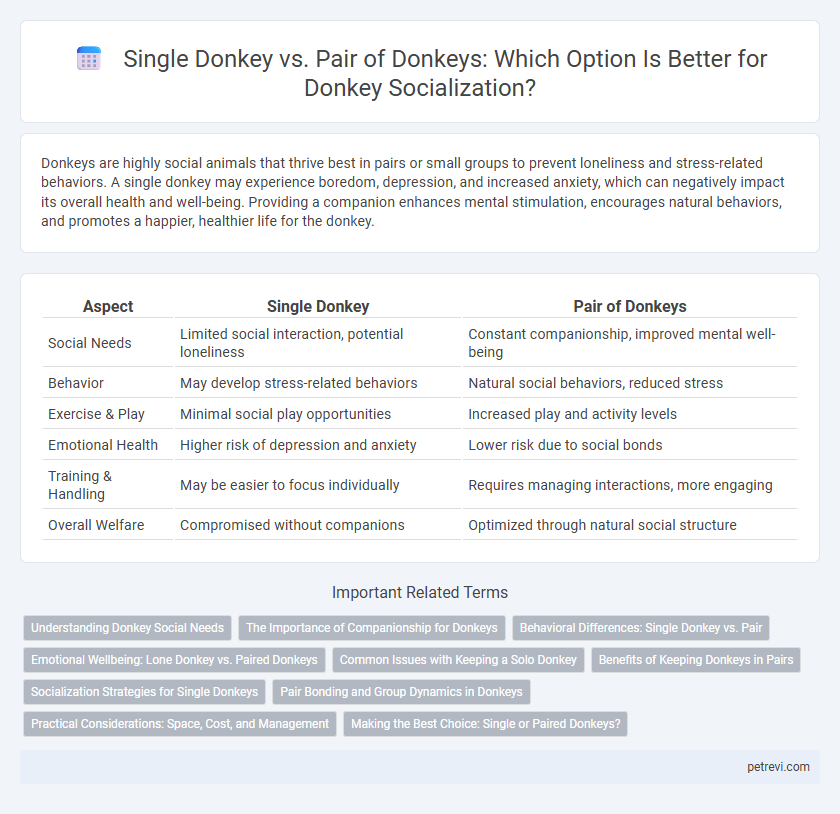Donkeys are highly social animals that thrive best in pairs or small groups to prevent loneliness and stress-related behaviors. A single donkey may experience boredom, depression, and increased anxiety, which can negatively impact its overall health and well-being. Providing a companion enhances mental stimulation, encourages natural behaviors, and promotes a happier, healthier life for the donkey.
Table of Comparison
| Aspect | Single Donkey | Pair of Donkeys |
|---|---|---|
| Social Needs | Limited social interaction, potential loneliness | Constant companionship, improved mental well-being |
| Behavior | May develop stress-related behaviors | Natural social behaviors, reduced stress |
| Exercise & Play | Minimal social play opportunities | Increased play and activity levels |
| Emotional Health | Higher risk of depression and anxiety | Lower risk due to social bonds |
| Training & Handling | May be easier to focus individually | Requires managing interactions, more engaging |
| Overall Welfare | Compromised without companions | Optimized through natural social structure |
Understanding Donkey Social Needs
Donkeys are inherently social animals that thrive in the company of other donkeys, with pairings providing essential companionship that supports their mental and emotional well-being. Single donkeys often exhibit signs of stress, isolation, and behavioral issues due to unmet social needs, highlighting the importance of at least one companion. Understanding donkey socialization requires recognizing their natural herd instincts and providing environments that allow interaction, grooming, and bonding to promote healthy psychological development.
The Importance of Companionship for Donkeys
Donkeys are highly social animals that thrive best with companionship, making a pair of donkeys significantly better for their mental and emotional well-being than a single donkey. Studies show that isolation in single donkeys often leads to stress-related behaviors and decreased overall health, while paired donkeys exhibit more natural behaviors, reduced anxiety, and increased social bonding. Providing a companion enhances their quality of life, ensuring proper socialization, emotional stability, and long-term happiness.
Behavioral Differences: Single Donkey vs. Pair
Single donkeys often exhibit signs of loneliness, such as vocalizing or repetitive behaviors, while pairs demonstrate more natural social interactions, including mutual grooming and play. Behavioral differences highlight that paired donkeys show reduced stress levels and increased overall well-being compared to solitary donkeys. This social bonding acts as a preventative measure against behavioral issues like aggressiveness and depression common in single donkeys.
Emotional Wellbeing: Lone Donkey vs. Paired Donkeys
Single donkeys often experience loneliness and stress, leading to behavioral issues and decreased emotional wellbeing. Paired donkeys engage in social bonding, which reduces anxiety and promotes mental stimulation, improving overall happiness and health. The presence of a companion donkey supports natural herd instincts, fostering emotional resilience and reducing the risk of depression.
Common Issues with Keeping a Solo Donkey
Keeping a single donkey often leads to behavioral issues such as loneliness, depression, and increased stress levels due to their natural herd instincts. These solitary donkeys may exhibit destructive behaviors like excessive braying, pacing, and self-mutilation, indicating poor mental health. In contrast, pairing donkeys promotes social interaction, reduces anxiety, and contributes to overall well-being.
Benefits of Keeping Donkeys in Pairs
Donkeys are highly social animals that thrive when kept in pairs, as companionship reduces stress and promotes natural behaviors such as mutual grooming and play. A single donkey may develop loneliness, leading to behavioral issues like vocalization or destructive tendencies, whereas paired donkeys demonstrate improved emotional well-being and physical health. Ensuring a pair of donkeys enhances their socialization, creating a stable and enriching environment essential for their overall welfare.
Socialization Strategies for Single Donkeys
Single donkeys require intentional socialization strategies such as increased human interaction, supervised playdates with other equines, and enrichment activities to prevent loneliness and behavioral issues. Pairing donkeys naturally encourages companionship, but focused training and environmental enrichment can effectively support the mental well-being of solitary donkeys. Understanding individual temperament helps tailor socialization plans to promote positive interactions and reduce stress in single donkeys.
Pair Bonding and Group Dynamics in Donkeys
Pair bonding in donkeys significantly enhances their socialization by providing mutual companionship and reducing stress-related behaviors often observed in single donkeys. Group dynamics within pairs promote natural grooming, synchronized activities, and hierarchical structures that contribute to emotional stability and overall well-being. Observations reveal that pairs of donkeys exhibit increased social interaction, leading to improved mental health and more balanced behavioral patterns compared to solitary individuals.
Practical Considerations: Space, Cost, and Management
Single donkeys require less space and lower maintenance costs, making them suitable for smaller farms or limited budgets. Pairing donkeys enhances socialization but demands larger enclosures and increased resource allocation for feed, shelter, and healthcare. Managing a pair involves monitoring interactions to prevent dominance issues and ensuring both receive adequate attention and nutrition.
Making the Best Choice: Single or Paired Donkeys?
Choosing between a single donkey and a pair significantly impacts donkey socialization and overall well-being. Donkeys are highly social animals that thrive in companionship, making a paired setup ideal for mental stimulation and emotional support. However, a single donkey can adapt if given ample human interaction and environmental enrichment to mimic social bonds.
Single Donkey vs Pair of Donkeys for Donkey Socialization Infographic

 petrevi.com
petrevi.com